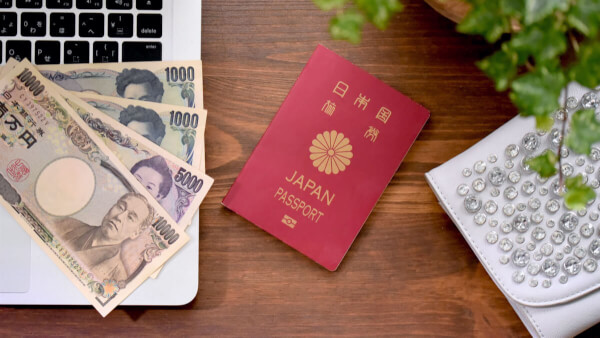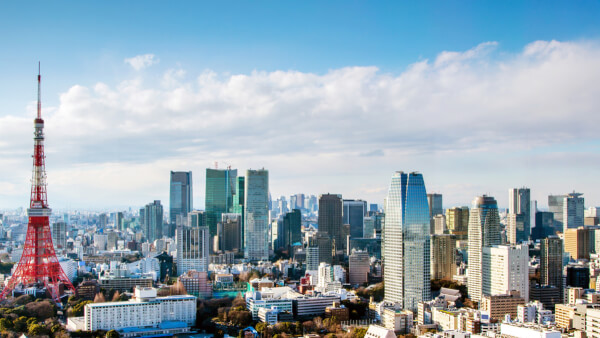How to open a bank account in Japan as a foreigner: US guide
Learn all about opening a bank account in Japan as an American, including costs, requirements, and alternatives.

Moving to Japan offers an exciting prospect with its delicious cuisine, beautiful natural destinations, modern cities, and captivating ancient culture.
Many people worldwide choose Japan for retirement, careers, or their next adventure.
Despite the challenges, armed with the right information, you'll be enjoying life on this Asian island in no time. This guide covers all you need to know about moving from the US to Japan.
| Currency | Japanese yen (JPY or ¥) |
| Population | 125 million |
| Capital | Tokyo |
| Language | Japanese |
| Weather | Hot and humid summers in many areas, with snowy winters in the east, and milder winter temperatures in the west |
| Amount of expats | Around 3 million |
| Biggest cities | Tokyo, Yokohama, Osaka, Nagoya |
| Average yearly salary | Varies widely by industry — overall average around 29,000 USD/year |
This guide will go into lots of useful details about how to live in Japan and how to move to Japan from the US, including the processes for Japanese immigration and how to get a Japan visa.
Let’s start with a few key pointers if you’re wondering how to move to Japan permanently:
|
|---|
Japan is one of a few countries where the visa process is largely identical regardless of whether you’re British, Australian, American, or from the EU. It’s also one of the most straightforward.
All you'll need to do is to apply for the relevant visa, depending on your reason for staying in Japan, at the nearest Japanese Embassy or Consulate General² in your home country. The documents that you should bring with you, are:
- Your passport
- Your visa application form
- A photograph
- A Certificate for completion of registration to the ERFS system, both the original and one copy.
The Certificate for completion of registration to the ERFS system is basically a certified letter from a Japanese person — typically an employer — who guarantees to support you financially while you’re in Japan. As such, the requirements for staying in Japan are pretty comparable to a work visa in other countries.
When you want to study in Japan, the visa application procedure is basically the same, only the Certificate for completion of registration to the ERFS system has to be provided by someone at the educational institution or university that you will be attending.
For some countries there are some additional requirements though, so make sure to check this with the embassy or on the website of the Ministry of Foreign Affairs of Japan³, before you start the process.
Yes. You can move to Japan from the US. You’ll need to apply for the relevant visa for your situation, at the Japanese Embassy or Consulate² which is closest to your home.
If you’re moving for the long term, you’ll usually also need your employer — or your school if you’re moving for study — to apply online in advance and obtain a Certificate for completion of registration to the ERFS system for you.
| 💡 Moving to Japan? We’ve selected the most important Japan-related articles for you – check them out! |
|---|
Before you finalize your plan to move to Japan, you’ll need to draw up a realistic budget. Your day-to-day costs can vary a lot depending on how you choose to live — so some research is essential. Here’s some key information to get you started.
Finances in Japan vary a little, depending on whether you’re comfortable immersing yourself in Japanese life or if you’ll be spending more time trying to get your hands on imported goods.
As an island nation, anything that has to be shipped to the country tends to be more expensive. The following table will give you an idea of some basic prices in Japan.
| Item | Cost in Japan⁴ |
|---|---|
| Meal, inexpensive restaurant | 7.22 USD |
| 3-course meal for 2 at a mid-range restaurant | 36.11 USD |
| Transportation pass (1 month) | 57.78 USD |
| Rent 1-bedroom apartment, city center | 661.86 USD/month |
| Rent 1-bedroom apartment, outside of city center | 433.02 USD/month |
Once you have your budget for daily life in Japan, you’ll also need to plan for the one-off moving costs you’ll run into. The cost of moving to Japan will vary a lot depending on whether you’re shipping all your things, moving to Japan with family, or even moving to Japan with your dog or cat. Important costs to think about include:
|
|---|
If you’re planning on moving to Japan with your pet it’s important to check all the rules about importing animals to the country.
In most cases, if you’re coming from the US, your pet will need to complete a quarantine process on arrival — the only exceptions may be if you’re moving from Hawaii or Guam which have been designated rabies free by Japan⁵.
Setting up your finances in Japan should be pretty straight forward, and you’ll have plenty of choice as you’ll be within one of the world’s best banking systems. The only part that may seem a little foreign is the process of opening a bank account over a cup of tea and polite conversation.
It’s not normally possible to open a Japanese bank account before you arrive in the country — and you may then need to wait a few days to get a cash card you can use to make ATM withdrawals. You’ll need to be prepared with ways to access your money while you wait.
| Usually to open your account you’ll need |
|---|
|
When sending money to or from Japan, you can cut down on international transfer costs with Wise.
Wise is an international money services provider that offers an affordable and secure way to send money internationally, all from the comfort of your own home.
You’ll get the mid-market exchange rate for all your transfers and know upfront how much and how long each transaction will take.
With the Wise Account, you’ll get all these brilliant benefits:
Please see Terms of Use for your region or visit Wise Fees & Pricing for the most up to date pricing and fee information
If you’re considered a tax resident in Japan you’ll pay personal income tax on a sliding scale from 5% to 45% based on your income, plus local taxes which are around 10%. Non-resident taxes are set at a flat rate of 20.42% of income⁶.
However, you’re advised to get personal tax advice to make sure you’re fully aware of all your obligations both in Japan and in the US after you relocate.
Finding a job in Japan can be difficult, as many companies prefer to hire Japanese citizens. It’s also almost always required that you speak Japanese — English speaking jobs are very rare.
If you’re able to secure a position, however, this is the number one best way to get all that's required for your visa.
If you’re looking for work in Japan, the following sites are a good place to start:
- Dai Job⁷
- GaijinPot⁸
- Jobs in Japan⁹
- Indeed¹⁰
If you’re financially secure and have some Japanese speaking skills (or a translator), finding a Japanese apartment won’t be too difficult. It’s possible — and common — to work directly with the landlord.
You might want to go through a real estate agent as they get a feel for neighborhoods, rent prices, and what to expect from the apartment itself. It could also be easier to find an English speaking agent, if you’re not yet familiar with the language.
Let’s look at some popular expat locations one by one.

If you’re considering moving to Tokyo you’re far from alone. As the capital city, Tokyo is a common place for expats to travel for work. It’s a huge city with plenty going on and a relatively frenetic way of life.
A major downside with Tokyo will be rental prices. An average one-bedroom apartment in the city center will set you back over 1,000 USD/month — a full 75% more than Osaka¹¹, which we’ll look at next.

Osaka has lower rental prices compared to Tokyo with a one-bed apartment in the center averaging under 600 USD/month¹¹. Osaka is the second-biggest economic hub in Japan — so still a good place to look for work — with friendly people and a real foodie culture. It’s modern and busy — but only half an hour by train from Kyoto when you need a bit of history and a slower pace for a weekend.

If you’ve been to Japan on vacation, there’s a high chance you’ll have taken in Kyoto — the country’s historical heart and home to geisha culture. Kyoto is a tourist hotspot with lots to do if you choose to stay for the longer term — giving you the best of both a slower pace of life when you need it, and plenty of foreign company if you choose to seek it out.
When it comes to rent prices, you’ll probably pay about 550 USD a month for a one-bed place in the city center, or under 350 USD/month outside the center¹².

Although Fukuoka is smaller than Tokyo, you’ll still get the modern vibe, with a lower price tag. It’s a great destination for entrepreneurs and people interested in the startup scene, with lots going on and some great culture to explore, too. Rent is in the region of 500 USD/month in the city center but on average under 350 USD/month outside the center¹².

If you’re into winter sports, you may know Sapporo as a previous host of the Winter Olympics. With a long winter and plenty of snow, it’s a great place if you enjoy skiing — with milder summers compared to many places, and lots of nature to get out exploring.
Rent prices here are among the lowest of our top pick cities — you can find a great one-bed place for an average of 400 USD/month in the center, and just 250 USD/month if you’re happy to be outside the center¹³.
Healthcare in Japan is geared towards the people. While individuals are required to carry their own health insurance, it is provided by a universal healthcare insurance system that guarantees mostly equal access to insurance and services, at a price laid out by the Japanese government.
For some special cases, like prenatal care, disease control, and screening exams, the government covers 70% of the cost of the treatment, with the individual being responsible for the other 30%. If you’re looking for a doctor in Japan, start with your new city’s local government website. Each city has their own online database of local doctors and clinics.
In case of an emergency, carry the numbers below with you, so you know who to call:
| Institution | Number |
|---|---|
| Coast Guard | 118 |
| Police | 110 |
| Fire/Ambulance | 119 |
| US Embassy (Tokyo) | +81 03 3224 5000 |
Though many Japanese people know the basics of English, Japan could be considered one of those countries where learning the language is key to fitting in. This will be an important factor of your life and how you build your relationships and work in the country.
For starters, you could try learning online with free websites or apps, but if you want a proper certification, it might be worth looking into a more complete course or even private tutoring.
Japan’s gaijin, or expat community, is pretty strong, as inclusivity in Japan is fairly limited to other Japanese people or those who speak excellent Japanese.
If you’re looking to meet up with other expats from your home country, a quick search on Facebook or meetup will produce tons of results.
In Japan, school starts at 6-years old, with a 9-year compulsory education system. The Japanese school year runs from April to March, with a relatively familiar typical timetable of around 8:15 AM through to 3:15 PM for most schools. Education is considered very important in Japan, and families expect their kids to work hard and get good grades.
As well as standard Japanese schools, there are also international schools in the main cities which offer different curricula and exams — you could keep your kids within the US system if you’re only planning on staying for a few years and will need them to reintegrate to a US school in the future.
Japan is a fascinating country with plenty to explore, learn and do. If you’re up for an adventure, moving to Japan can be a great opportunity — whether you want to work to boost your career, study the culture and language, or spend your time getting to see how things work in the Land of the Rising Sun. Use this guide to start your research and get planning your move to Japan — good luck!
Sources checked on 18 July 2023
*Please see terms of use and product availability for your region or visit Wise fees and pricing for the most up to date pricing and fee information.
This publication is provided for general information purposes and does not constitute legal, tax or other professional advice from Wise Payments Limited or its subsidiaries and its affiliates, and it is not intended as a substitute for obtaining advice from a financial advisor or any other professional.
We make no representations, warranties or guarantees, whether expressed or implied, that the content in the publication is accurate, complete or up to date.

Learn all about opening a bank account in Japan as an American, including costs, requirements, and alternatives.

Learn all about buying a car in Japan as an American, including costs, requirements, and how to import your vehicle back to the US.

Wondering if you're eligible for Japanese citizenship? Find everything you need to know in this handy guide.

Americans love Japan. They love the unique culture, cherry blossoms, the never ending nightlife of Tokyo and of course, sushi. Japanese culture fascinates...

Whether you’re an expat already, looking for a second home for family vacations, or want a smart investment, buying real estate in Japan can be a good move....

Japan is a country with a rich history and growing economy. In certain industries, like the tech sector, booms are starting to happen. Japan is quickly...